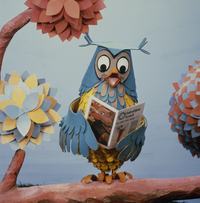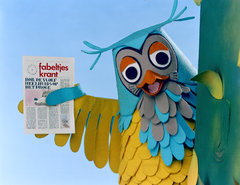- Fabeltjeskrant
-
Fabeltjeskrant 
Format Puppetry
Stop motionCountry of origin  Netherlands
NetherlandsNo. of episodes 1640 Production Producer(s) Thijs Chanowski
Loek de LevitaRunning time 4/5 minutes Broadcast Original channel  RTL 8
RTL 8
 Récré A2
Récré A2
 ?
?
 RAI 1 / TMC
RAI 1 / TMC
 ?
? ITV
ITVOriginal run 1968 – 1989 Fabeltjeskrant (or De Fabeltjeskrant, Dutch for "The Fables Newspaper") is a Dutch children's television series featuring puppetry and stop motion. Created in 1968 by Leen Valkenier and produced by Thijs Chanowski (1st series) and Loek de Levita (2nd series), it ended in 1989 and was broadcast on the Dutch channels NOS, RTL 4 and RTL 8[1]. From 1973 to 1975 it was broadcast also in the United Kingdom, on ITV, with the title The Daily Fable[2].
Contents
Plot
Each episode is based upon fables of Jean de La Fontaine, Aesop, Phaedrus and also by the series' scenographer Leen Valkenier. The main character, the owl "Meneer de Uil", introduces each episode reading a fable to other characters upon a tree. The scene is a forest inhabited by different antropomorphic paper animals and the first episode was broadcast in 29 September 1968 on NOS.
Characters
All character surnames are referred to their species.
- Meneer de Uil (Meneer the Owl), or Jacob de Uil[3][4], is an owl and the main character of the series. In British version its name is "Mr. Owl"[2].
- Other characters: Juffrouw Ooievaar, Lowieke de Vos, Crox de Raaf (or Meneer de Raaf), Bor de Wolf, Ed Bever, Willem Bever, Zoef de Haas, Stoffel de Schildpad, Momfer de Mol, Truus de Mier, Gerrit de Postduif, Meindert het Paard, Myra Hamster, Martha Hamster, Woefdram, Isadora Paradijsvogel, Droes de Beer, Jodocus de Marmot, Chico Lama, Zaza Zebra, John Maraboe, Greta Bontekoe, Teun Stier, Oléta Vulpécula, Harry Lepelaar, Piet de Pad, Tijl Schavuit, Sjefke Schelm, Rocus de Vrije Vogel, Pepijn de Kater, Timme de Hond, Plons de Kikvors, Blinkert de Bliek, Arthur de Leeuw, Flora Nachtegaal, George de Wezel, Stokebrand de Mug, Mia de Muilezel, Maup de Muis, Marius de Bok, Irma de Krekel, Orm de Aap, Toeter de Olifant, Kirreke de Tortelduif, Koer de Tortelduif, Frija Forel, Greta 2, Hondje Woef, Wasa de Beer, Melis Das, Lamaar Snoespoes, Woef Hektor, Wip de Eekhoorn, Gies de Vlieg, Arie de Rat, Borita, Cas de Kraai and Asa de Spin[5].
In other countries
The show was adapted in many European countries with different titles:
 France: Le petit écho de la Forêt[6] (French for The Little Echo of the Forest)
France: Le petit écho de la Forêt[6] (French for The Little Echo of the Forest) Hungary: Fabulácskahírek[7] (Hungarian for The Fables Newspaper)
Hungary: Fabulácskahírek[7] (Hungarian for The Fables Newspaper) Italy: Il bosco dei perché[8][9] (Italian for The Wood of the Questions)
Italy: Il bosco dei perché[8][9] (Italian for The Wood of the Questions) Sweden: Fablernas värld[10] (Swedish for World of Fables)
Sweden: Fablernas värld[10] (Swedish for World of Fables) United Kingdom: The Daily Fable[2]
United Kingdom: The Daily Fable[2]
Notes and references
- ^ (Dutch) Infos on "Fabeltjesweb"
- ^ a b c Article on tvcream
- ^ (Dutch) Meneer de Uil on "Fabeltjesweb"
- ^ See also nl:Meneer de Uil
- ^ (Dutch) List of the characters on "Fabeltjesweb"
- ^ (French) Article about "Le petit écho de la Forêt"
- ^ See also: hu:Fabulácskahírek
- ^ (Italian) Article about "Il bosco dei perché"
- ^ See also: it:Il bosco dei perché
- ^ See also: sv:Fablernas värld
See also
- Sesamstraat (another Dutch children's television series featuring puppetry)
External links
- (Dutch) Fabeltjeskrant official site
- Fabeltjeskrant at the Internet Movie Database
- (Dutch) Official video showing how an episode is made (WMV format)
Categories:- Dutch children's television series
- 1968 television series debuts
- Television programs featuring puppetry
- Stop-motion animated television series
- Children's ITV television programmes
Wikimedia Foundation. 2010.


